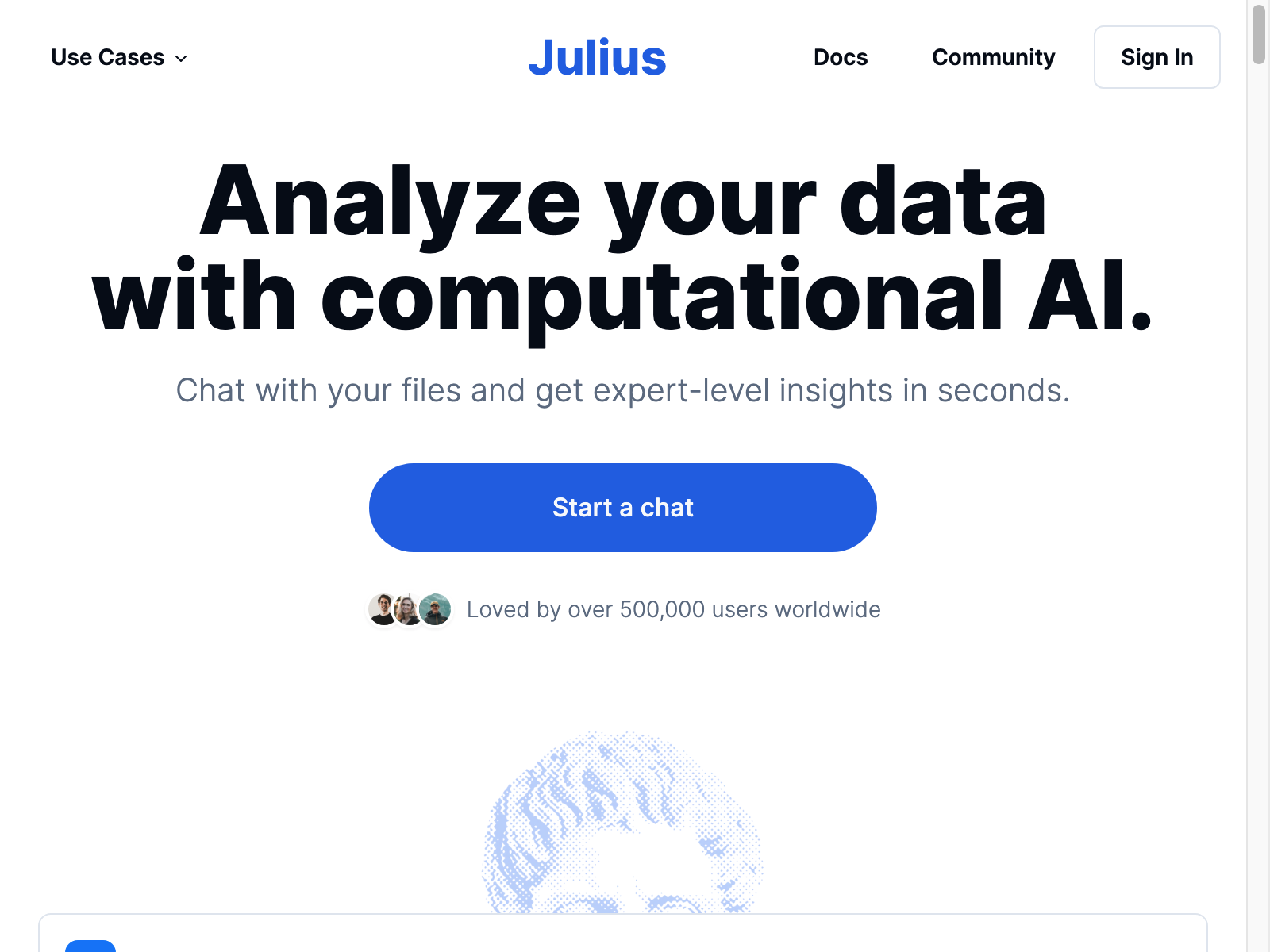Julius AI: Your AI Data Analyst

Julius Ai Overview
Julius is a powerful AI data analyst that helps you analyze and visualize your data. With its intuitive chatbot-like interface, you can easily ask questions, create graphs, build forecasting models, and more, all without the need for complex data analysis skills.
In our in-depth review, we'll take a closer look at the key features, use cases, pros and cons, pricing, and alternatives of this innovative AI tool. Whether you're a data analyst, business owner, or simply someone looking to gain better insights from your data, Julius AI could be the solution you've been searching for.
Julius Ai Key Features
- Conversational Data Analysis: Julius AI's chatbot-like interface allows you to communicate with your data in natural language, eliminating the need for complex data query languages.
- Automated Visualizations: Julius can automatically generate a variety of charts and graphs based on your data, helping you quickly identify trends and patterns.
- Predictive Modeling: The tool's forecasting capabilities allow you to create predictive models, enabling you to make data-driven decisions about the future.
- Collaborative Features: Julius supports team collaboration, allowing multiple users to access and work on the same data and analyses.
- Data Connectivity: The tool integrates with a wide range of data sources, including spreadsheets, databases, and cloud-based platforms.
Julius Ai Use Cases
Julius AI is a versatile tool that can be applied to a wide range of industries and use cases, including:
- Financial Analysis: Analyze financial data, create budgets, and generate forecasts to inform strategic decision-making.
- Marketing Optimization: Gain insights into marketing performance, customer behavior, and campaign effectiveness.
- Operations Optimization: Identify inefficiencies, streamline processes, and make data-driven decisions to improve overall business operations.
- Sales Forecasting: Leverage historical sales data to create accurate forecasts and make informed decisions about resource allocation and inventory management.
Julius Ai Pros and Cons
Pros:
- Intuitive, conversational interface for data analysis
- Automated visualization capabilities for quick insights
- Robust predictive modeling and forecasting features
- Collaborative tools for team-based data exploration
- Wide range of data source integrations
Cons:
- Learning curve for users unfamiliar with AI-driven data analysis
- Potential data security and privacy concerns for sensitive information
- Limited customization options for advanced visualization needs
- Subscription-based pricing model that may not suit all budgets
Julius Ai Pricing
Julius AI offers the following pricing plans:
| Plan | Price |
|---|---|
| Basic | $49/month |
| Pro | $99/month |
| Enterprise | Custom pricing |
The Basic plan includes core data analysis and visualization features, while the Pro plan adds advanced forecasting, collaboration, and data connectivity options. Enterprise-level pricing is available for organizations with more complex data needs and security requirements.
Julius Ai Alternatives
While Julius AI is a powerful and feature-rich data analysis tool, there are a few alternatives worth considering:
- Tableau: A renowned data visualization and business intelligence platform with robust analytical capabilities.
- Microsoft Power BI: A comprehensive business analytics solution that offers data integration, modeling, and reporting features.
- Qlik Sense: An intuitive data analytics platform that emphasizes self-service data exploration and visualization.
Each of these alternatives has its own strengths and may be better suited to certain use cases or organizational needs. It's worth evaluating your specific requirements to determine the best fit for your data analysis needs.
Julius Ai FAQ
-
What type of data can Julius AI work with? Julius AI can integrate with a wide range of data sources, including spreadsheets, databases, cloud-based platforms, and more. The tool is designed to handle structured data, making it suitable for a variety of business applications.
-
How difficult is it to use Julius AI? One of the key strengths of Julius AI is its user-friendly, conversational interface. The tool is designed to be intuitive and easy to use, even for those without extensive data analysis experience. However, users may still need to invest some time in learning the tool's capabilities and features.
-
Does Julius AI offer data security and privacy features? Julius AI takes data security and privacy seriously, with various measures in place to protect sensitive information. These include encryption, access controls, and compliance with industry standards. However, it's important to thoroughly review the tool's security features and policies to ensure they meet your organization's specific requirements.
-
Can Julius AI be integrated with other business tools? Yes, Julius AI offers integration capabilities with a variety of other business tools and platforms, such as CRM systems, marketing automation platforms, and project management software. This allows users to seamlessly incorporate data analysis and visualization into their existing workflows.